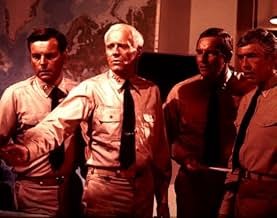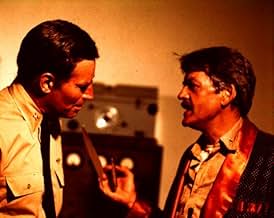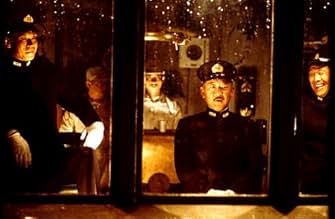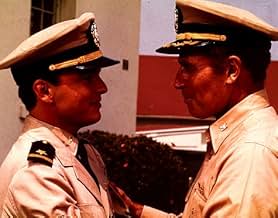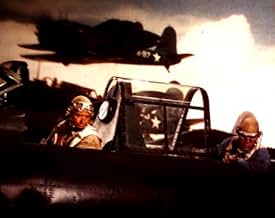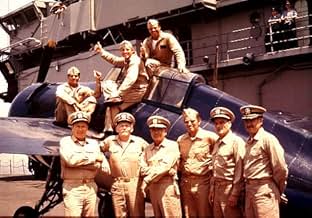IMDb रेटिंग
6.8/10
23 हज़ार
आपकी रेटिंग
लड़ाई का एक नाटकीयकरण जिसे व्यापक रूप से द्वितीय विश्व युद्ध के प्रशांत रंगमंच के एक महत्वपूर्ण मोड़ के रूप में हेराल्ड किया गया था।लड़ाई का एक नाटकीयकरण जिसे व्यापक रूप से द्वितीय विश्व युद्ध के प्रशांत रंगमंच के एक महत्वपूर्ण मोड़ के रूप में हेराल्ड किया गया था।लड़ाई का एक नाटकीयकरण जिसे व्यापक रूप से द्वितीय विश्व युद्ध के प्रशांत रंगमंच के एक महत्वपूर्ण मोड़ के रूप में हेराल्ड किया गया था।
Toshirô Mifune
- Admiral Isoroku Yamamoto
- (as Toshiro Mifune)
फ़ीचर्ड समीक्षाएं
I can't help but agree with most of the other comments: the sloppy production values, the scenes "borrowed" from better movies, the countless anachronisms, the distracting subplot about Lt. Garth and his Japanese girlfriend, and so on. But for me, this movie has two strong points in its favor. One, when they get around to the actual battle, they follow the history with surprising accuracy. (The "Pearl Harbor" makers could have learned something from this one.) So the movie's hard to follow? So was the actual battle! Personally, I think they did a pretty good job of keeping the flow coherent while still remaining faithful to its source material.
The second thing in its favor is that, from the moment I first saw it in the theater as a 10 year old, it ignited in me a passion for the Battle of Midway that remains to this day. I can't think of any other movie that even comes close to getting me as hooked on its subject as this one. Maybe it's a good thing I first saw it when I was young, when I was much less discerning about production values, etc. That way, I could concentrate on the story itself.
If you have even the slightest interest in military history or even in important historical events in general, do yourself a favor. Watch "Midway" to get an overview of the event (fast-forward over the love-story scenes if you like), then go read "Incredible Victory" by Walter Lord (which is a better book than the one for which he is most famous, "A Night to Remember"). You won't be sorry.
The second thing in its favor is that, from the moment I first saw it in the theater as a 10 year old, it ignited in me a passion for the Battle of Midway that remains to this day. I can't think of any other movie that even comes close to getting me as hooked on its subject as this one. Maybe it's a good thing I first saw it when I was young, when I was much less discerning about production values, etc. That way, I could concentrate on the story itself.
If you have even the slightest interest in military history or even in important historical events in general, do yourself a favor. Watch "Midway" to get an overview of the event (fast-forward over the love-story scenes if you like), then go read "Incredible Victory" by Walter Lord (which is a better book than the one for which he is most famous, "A Night to Remember"). You won't be sorry.
Of course "Midway" is a flawed movie. The subplot about Japanese-Americans is ridiculous and seems like a forced attempt to be PC during the post-Vietnam 1970s when it wasn't in fashion to be completely celebratory of America. Of course it's unsatisfying that the Japanese actors don't speak Japanese and we have to hear Paul Frees dubbing Toshiro Mifune. Of course the stock footage isn't going to please aviation and naval buffs who know these details like the back of their hands, but to me this is a trivial complaint that fails to take into account the limits of 1970s technology or budgeting. "Pearl Harbor" ultimately got those details right through CGI and the end result was a far worse film in the final analysis. Because ultimately, for all the flaws that are in "Midway" it succeeds because it does stick to the essential truths when telling the story of the battle, and I know this because when I first saw this movie on the CBS Late Movie around 1979, I got so hooked that I went out and read every book on the battle I could find including Walter Lord's "Incredible Victory." The movie had given me a starting reference point and while I was sorry that some key aspects of the latter stages of the battle were not depicted (such as the torpedoing and eventual sinking of the Yorktown), I couldn't have asked for anything better in terms of getting me to learn more about this great turning point of World War II. As far as I'm concerned, it's good that Hollywood did tackle this subject in an era when the influence of "Tora! Tora! Tora!", "The Longest Day" etc. still hung over the proceedings because if it hadn't been made back then, we would today be forced to see it given the "Pearl Harbor" and "Titanic" treatment that is pure garbage.
John Williams contributes one of his finer pre-Star Wars scores with two great themes, the "Midway March" (which is only heard in the end credits of the theatrical version and became more popular in an expanded concert arrangement by the Boston Pops) and the "Men Of The Yorktown March" which dominates much of the score and offers great foreshadowings of the Throne Room sequence in "Star Wars" and the Smallville music in "Superman."
John Williams contributes one of his finer pre-Star Wars scores with two great themes, the "Midway March" (which is only heard in the end credits of the theatrical version and became more popular in an expanded concert arrangement by the Boston Pops) and the "Men Of The Yorktown March" which dominates much of the score and offers great foreshadowings of the Throne Room sequence in "Star Wars" and the Smallville music in "Superman."
The film Midway shows in graphic documentary style, the battle that did nothing less than save America and ultimately allow us to win World War II. If the Japanese had prevailed at Midway, they might very well have taken Hawaii and been blockading our continental Pacific coast. We might have had to declare a truce and hope that public opinion would allow us to continue the European and North African war. Remember the USA was brought in to the war because of the Japanese attack at Pearl Harbor, not Hitler's attack.
There is a plot of sorts with Charlton Heston as the fictional pilot group commander who's involved in helping his son Edward Albert help a Nisei family who've been interred for the duration of the war because Albert is engaged to the daughter. That's the one weakness of Midway, the story really wasn't necessary and detracted with the very precise telling of the Midway tale. Had they left it out, Midway had the potential to be a classic like The Longest Day.
Without Charlton Heston and his family problems, the story of Midway is told with remarkable historic accuracy. Henry Fonda who played Admiral Chester W. Nimitz in all but name in In Harm's Way, gets to play Nimitz again in Midway. Robert Mitchum and Glenn Ford play Admirals William Halsey and Raymond Spruance who between the two of them won America's Pacific war. A whole lot of fine character actors like James Coburn, Robert Wagner, Robert Webber, Hal Holbrook and many more fill their naval roles to precision.
The story of the Battle of Midway should be told and told again in America's public schools for future generations. Not just because of the sailors and airmen of America's greatest generation who fought and prevailed at Midway, but because of just how close a run thing the Battle of Midway was. One very fateful decision by Admirals Yamamoto and Nagumo turned the tide of battle on a dime. By the way the oriental players in Midway like Toshiro Mifune as Yamamoto and James Shigeta as Nagumo and others also play very well. The American cinema certainly came a long way from when they previously cast the Japanese as bucktooth primates.
When the viewer sees just how much pure luck played a part in winning at Midway, they will come away with one of two impressions. The first might be that a divine providence is guiding and protecting America. If so, who's to say that will always be the case. And if not, the second lesson might be that we as a country might not always be so lucky.
If they could edit out the Heston family story, Midway is a great film for history classes studying World War II.
There is a plot of sorts with Charlton Heston as the fictional pilot group commander who's involved in helping his son Edward Albert help a Nisei family who've been interred for the duration of the war because Albert is engaged to the daughter. That's the one weakness of Midway, the story really wasn't necessary and detracted with the very precise telling of the Midway tale. Had they left it out, Midway had the potential to be a classic like The Longest Day.
Without Charlton Heston and his family problems, the story of Midway is told with remarkable historic accuracy. Henry Fonda who played Admiral Chester W. Nimitz in all but name in In Harm's Way, gets to play Nimitz again in Midway. Robert Mitchum and Glenn Ford play Admirals William Halsey and Raymond Spruance who between the two of them won America's Pacific war. A whole lot of fine character actors like James Coburn, Robert Wagner, Robert Webber, Hal Holbrook and many more fill their naval roles to precision.
The story of the Battle of Midway should be told and told again in America's public schools for future generations. Not just because of the sailors and airmen of America's greatest generation who fought and prevailed at Midway, but because of just how close a run thing the Battle of Midway was. One very fateful decision by Admirals Yamamoto and Nagumo turned the tide of battle on a dime. By the way the oriental players in Midway like Toshiro Mifune as Yamamoto and James Shigeta as Nagumo and others also play very well. The American cinema certainly came a long way from when they previously cast the Japanese as bucktooth primates.
When the viewer sees just how much pure luck played a part in winning at Midway, they will come away with one of two impressions. The first might be that a divine providence is guiding and protecting America. If so, who's to say that will always be the case. And if not, the second lesson might be that we as a country might not always be so lucky.
If they could edit out the Heston family story, Midway is a great film for history classes studying World War II.
Like "The Longest Day" and "Tora! Tora! Tora!", "Midway" follows the true story very closely and features an all star cast. And like the Longest Day, it features Henry Fonda, Robert Mitchum, and Robert Wagner. However, whereas the first two are war classics, Midway falls short in many departments.
For one, the movie seems to have no sense of building suspense. In the Longest Day, the paratrooper landings and the scenes of bombardment vessels creeping toward the shore let you know that all hell is about to break loose. Likewise, in Tora! Tora! Tora!, scenes of anxious commanders, desperate analysts, and the oblivious Hawaii residents are separated by scenes of approaching Japanese bombers to hike the suspense factor. Yet, despite the fact that Midway was the most decisive naval battle in modern history, we don't get a true sense of how important the pilots' jobs are or how grave the implications of the battle are, except for from titles before and after the movie. Where were the scenes of planes prepping for takeoff or of pilots, wary but dutiful about a mission that may be their last?
The battle sequences are another problem. First off, most of the footage is actual war footage or stock footage. The stock footage works fine for the bombing of Tokyo (since the shown footage is actually about that event) but is a little less convincing when the footage shown is supposed to be of Hawaii's Hickam Field but is passed off as Midway Island. Worse than the presence of stock footage is the editing. While maps of the ocean are shown repeatedly so that we know where the action is taking place, it's hard to tell what's what when we're away from the maps. We see planes crash into water and bombs explode, but most of the battle sequences could use a little more coherence. Had the makers of this movie shot a little combat footage of their own, even if only to make the battle scenes less jump, the movie would have benefitted.
For the most part, the cast is pretty good and fares well with only occasionally trite dialogue. However, only Heston, Holbrook, and Shigeta stand out. Many of the other players are simply not given enough time to make an impact. Coburn, especially, has little to do.
The flaws of this movie notwithstanding, it's still watchable, and it gives you a pretty good idea of the events and decisions leading up to the battle, as well as the errors and luck that went into the battle itself. And when you can't figure out what's happened from the uneven visuals, at least Nimitz (Fonda) or his at-sea commanders are there to describe what happened and add some perspective.
** out of ****
For one, the movie seems to have no sense of building suspense. In the Longest Day, the paratrooper landings and the scenes of bombardment vessels creeping toward the shore let you know that all hell is about to break loose. Likewise, in Tora! Tora! Tora!, scenes of anxious commanders, desperate analysts, and the oblivious Hawaii residents are separated by scenes of approaching Japanese bombers to hike the suspense factor. Yet, despite the fact that Midway was the most decisive naval battle in modern history, we don't get a true sense of how important the pilots' jobs are or how grave the implications of the battle are, except for from titles before and after the movie. Where were the scenes of planes prepping for takeoff or of pilots, wary but dutiful about a mission that may be their last?
The battle sequences are another problem. First off, most of the footage is actual war footage or stock footage. The stock footage works fine for the bombing of Tokyo (since the shown footage is actually about that event) but is a little less convincing when the footage shown is supposed to be of Hawaii's Hickam Field but is passed off as Midway Island. Worse than the presence of stock footage is the editing. While maps of the ocean are shown repeatedly so that we know where the action is taking place, it's hard to tell what's what when we're away from the maps. We see planes crash into water and bombs explode, but most of the battle sequences could use a little more coherence. Had the makers of this movie shot a little combat footage of their own, even if only to make the battle scenes less jump, the movie would have benefitted.
For the most part, the cast is pretty good and fares well with only occasionally trite dialogue. However, only Heston, Holbrook, and Shigeta stand out. Many of the other players are simply not given enough time to make an impact. Coburn, especially, has little to do.
The flaws of this movie notwithstanding, it's still watchable, and it gives you a pretty good idea of the events and decisions leading up to the battle, as well as the errors and luck that went into the battle itself. And when you can't figure out what's happened from the uneven visuals, at least Nimitz (Fonda) or his at-sea commanders are there to describe what happened and add some perspective.
** out of ****
Saturday night TV is a bit of a dead zone down here so I suppose one should be grateful for the odd watchable movie, even if its 20 years old. This one looks older than it actually is, due to the liberal use of stock footage and a cast that's a retirement counsellor's dream. A relatively youthful Charlton Heston is in the lead, but there's Henry Fonda, Glenn Ford, Robert Mitchum, Robert Webber and even the great Japanese actor Toshiro Mifune. A curious aspect is that every military character with a speaking part is an officer; the grunts just get to grunt. It's very much the view from the bridge (and the pilot's seat). Despite this aspect and the attempt at historical realism it's not made clear quite how it was that the Japanese made the error that cost them the battle, getting caught with their flightdecks full just as the American torpedo bombers arrived. The contribution of the American land-based aircraft is also given scant recognition.
Still you do get a bit of a story, though the less said about the silly sub-plot involving the Heston character's son and a Japanese-American girl the better. The director, Jack Smight had extensive T V experience, as did many of the younger actors, and this shows up in the rather static dialogue scenes you get when you aren't allowed to move the cameras much. The Japanese voices are dubbed, so that Paul Free, the voice of Boris Badenov in "Bullwinkle," (and countless other cartoon characters) is Admiral Yamamoto. The music was written by John Williams who a year or so later did the music for "Star Wars" and you can sense the similarities.
In the film the military operations side of things abounds with anacronisms, partly due to the liberal use of stock footage as mentioned. I don't think you can be too hard on the producers (the low profile but financially successful Mirisch Brothers) for not using a real Japanese World War 2 aircraft carrier since they are all at the bottom of the sea, but the crashed jet on the Yorktown's flightdeck was a bit sloppy. "Tora Tora Tora," which cost more money, was a better film. Not because it cost more money but because it was more carefully made, more balanced (both side's story told well) and more honest, perhaps also because it dealt with defeat rather than victory from the American viewpoint. "Midway" has some suspense, plenty of action, and the the patriotism drum is not banged to the point of pain.
Still you do get a bit of a story, though the less said about the silly sub-plot involving the Heston character's son and a Japanese-American girl the better. The director, Jack Smight had extensive T V experience, as did many of the younger actors, and this shows up in the rather static dialogue scenes you get when you aren't allowed to move the cameras much. The Japanese voices are dubbed, so that Paul Free, the voice of Boris Badenov in "Bullwinkle," (and countless other cartoon characters) is Admiral Yamamoto. The music was written by John Williams who a year or so later did the music for "Star Wars" and you can sense the similarities.
In the film the military operations side of things abounds with anacronisms, partly due to the liberal use of stock footage as mentioned. I don't think you can be too hard on the producers (the low profile but financially successful Mirisch Brothers) for not using a real Japanese World War 2 aircraft carrier since they are all at the bottom of the sea, but the crashed jet on the Yorktown's flightdeck was a bit sloppy. "Tora Tora Tora," which cost more money, was a better film. Not because it cost more money but because it was more carefully made, more balanced (both side's story told well) and more honest, perhaps also because it dealt with defeat rather than victory from the American viewpoint. "Midway" has some suspense, plenty of action, and the the patriotism drum is not banged to the point of pain.
क्या आपको पता है
- ट्रिवियाKevin Dobson's character Ensign George Gay, was the sole survivor of Torpedo Squadron 8. Gay wrote a book about his experiences (Sole Survivor) and was an advisor on this film.
- गूफ़When the cockpit of one of the planes catches fire, the pilot pulls out a fire extinguisher. It is a more modern one, not a fire extinguisher that would have existed in the 1940s.
- भाव
Vice Adm. Chuichi Nagumo: [commenting on the American torpedo bombers] They sacrifice themselves like samurai, these Americans.
- इसके अलावा अन्य वर्जनA television version exists, with additional cast and plot. It runs four hours with commercials. The main plot points are a Charlton Heston-Susan Sullivan romance and the Coral Sea battle (reffered to in the other version) is played out like the Midway battle. The Coral Sea battle heavily features Mitchell Ryan as Admiral Aubrey Fitch and also includes a subplot where a young Japanese pilot who'd met with Admiral Nagumo to express his opposition to Japanese military action is shot down. At the end of the TV version, Sullivan and Christine Kukobo are both shown waiting dockside.
- कनेक्शनEdited from Salute to the Marines (1943)
- साउंडट्रैकIn the Mood
Music by Joe Garland
Performed by the Glenn Miller and His Orchestra (as Glenn Miller Orchestra) on the jukebox at the bar in Hawaii
टॉप पसंद
रेटिंग देने के लिए साइन-इन करें और वैयक्तिकृत सुझावों के लिए वॉचलिस्ट करें
- How long is Midway?Alexa द्वारा संचालित
विवरण
बॉक्स ऑफ़िस
- US और कनाडा में सकल
- $4,32,20,000
- US और कनाडा में पहले सप्ताह में कुल कमाई
- $43,56,666
- 20 जून 1976
- चलने की अवधि2 घंटे 12 मिनट
- रंग
- पक्ष अनुपात
- 2.39 : 1
इस पेज में योगदान दें
किसी बदलाव का सुझाव दें या अनुपलब्ध कॉन्टेंट जोड़ें



